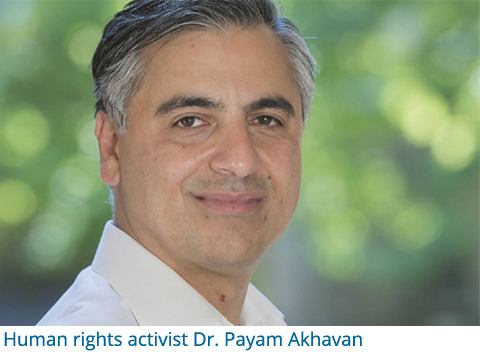 |
 |
|
April 27, 2021 In Search of International Justice  The 19th “Big Ideas” presentation was a series highlight. Speaker Dr. Payam Akhavan is a Canadian Bahá’í, a professor at the McGill and (currently) Toronto law schools. He has served widely as a human rights officer of the United Nations, and as a war-crimes prosecutor has appeared before the International Criminal Court and the United Nations’ International Court of Justice. His “human rights odyssey” was told in the 2017 Massey Lectures, later published as the best-selling In Search of a Better World. To an online audience of over 140, Dr. Akhavan spoke of “Justice for Genocide: Reflections on Human Rights and the World Court”. He started with the end of the second World War: “In January 1945, Russian soldiers came across an industrial site in Poland...” They had stumbled across Auschwitz and the Holocaust. “Genocide” was then a newly coined word. In December 1948, the newly formed United Nations proclaimed its Universal Declaration of Human Rights. A day before, its Convention of Genocide declared, Never again. War crimes tribunals tried some of those responsible for the worst atrocities. This period was, according to Akhavan, “a window of hope” opening on a hard-won respect for human rights. However, throughout the Cold War and beyond, “a cynical culture of privileging power over justice” saw numerous further genocides. The weaknesses of the United Nations have been obvious. Today we still have no true global governance to enforce accepted anti-genocide and human rights principles, but Dr. Akhavan asserted that there is substantial progress. The Berlin Wall fell in 1989. An American president called in 1991 for “a new world order” to replace that great power standoff. Those familiar with the Bahá’í teachings were heartened. Bahá’u’lláh had taught not only the spiritual ideals of the oneness of humanity, but had prescribed mechanisms for global unity, including his 19th-century call to kings and rulers to establish a global commonwealth. Slowly, steps have been taken: an international Criminal Tribunal prosecuted a head of state after the Yugoslav Wars; the permanent International Criminal Court was formed in 1998, though it is hampered by the refusal of many key nations to ratify its authority. The will to create a world order is gradually growing, but we seem to need the unimaginable suffering of Rwanda or Darfur to fuel this progress.
|
|
|